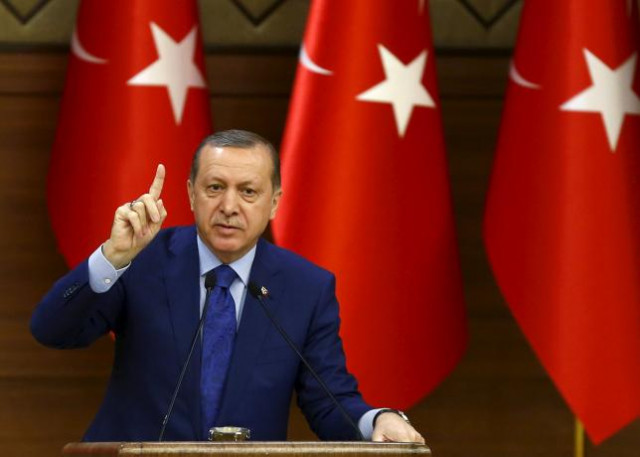Analysis: President Erdogan’s botched and rash statesmanship
After the coup attempt, over 72,000 officials have been purged, 18,000 have been detained & 9,000 arrested in a month

Turkish President Recep Tayyip Erdogan. PHOTO: REUTERS
Over a million people attended the biggest gathering in the nation since 1974, while thousands of others watched the event live on television and social media platforms. Pro-government Turkish media, however, exaggerated the number of attendees to around five million. But the rarest moment was General Hulusi Akar’s speech. Clad in military fatigues, the commander of armed forces vowed to give the harshest punishment to traitors and also thanked civilians for saving the country. Despite being taken hostage on the coup’s night, Akar refused to side with his rogue subordinates.
President Recep Tayyip Erdogan used the occasion to directly blame Fathullah Gulen, a self-exiled Pennsylvania-based scholar who was closely allied to him until 2012, for planning the coup. Pledging to purge the country of ‘Gulenists’, part of the Fethullah Terror Organisation, Erdogan advocated reviving the death penalty.
Mass unity rally against Turkey coup plotters
“Of course we have to uncover all members of this organisation and eradicate them within the framework of the law, but if we content ourselves with just that, then we as a state and a nation will leave weak our defence against similar viruses," said the former Istanbul mayor who has been riding the biggest wave of populism since he took office.
But Gulen’s influence within the armed forces was said to be miniscule if not non-existent. Analysts find it implausible for his followers to plan, organise and execute such a coup without being tracked by the intelligence agencies. Gulen was also amongst the first few to condemn the failed putsch as it unfolded later, alleging Erdogan to have carried it out to further tighten his grip on military and bureaucracy alike. On the other hand, the coup is said to be an operation launched by ultra-nationalists who were annoyed of Erdogan’s Islamist policies and his most recent apology to Russia’s Vladimir Putin.
Ankara crossing boundaries
With rival politicians, public and military on his side, Erdogan has no patience to wait for the complete legal process to take its course, although Turkey’s judiciary is anything but independent. As a result, over 72,000 officials have been purged, including judiciary members and 95 football coaches. So far 18,000 have been detained and 9,000 arrested in less than a month. More than thousand schools and hostels have been closed, and around 1,200 NGOs banned. Seventy-seven journalists have also been arrested while over 150 news outlets have been shut. In fact, anyone tainted with allegations of support for the July 15 rebellion haven’t been given a chance to prove their innocence and have been found guilty by the state. But none of the three military chiefs have been sacked for their failure to maintain discipline, which resulted in a failed coup that claimed 270 lives, costing Turkey over US$100 billion.
Leader of Germany's liberal party compares Turkey coup reaction to Nazis
Amidst pro-democracy celebrations on Sunday came the news of the custodial death of a high school teacher, Gokhan Acikkollu. The diabetic patient was arrested on July 23 and allegedly denied access to medicines. Instead of returning his body the government plans to bury Acikkollu in the ‘traitors’ graveyard, even though he wasn’t even tried in court for backing the military coup.
In another case, 86-year-old Dudu Cakir was detained after her lawyer son Muhammad Cakir could not be found. The government has not denied allegations of Dudu still being held in custody (legally called hostage). Hacer Korucu, wife of journalist Bulent Korucu, has been held hostage until her husband surrenders to the police.
Foreign media has also reported rape and other forms of physical abuse meted out to detainees, drawing parallels with Adolf Hitler’s regime. But Ankara is using the excuse of three-month long emergency and suspension of the European Convention on Human Rights for carrying out these crimes, even though some rights in the convention, such as right to life and ban on retroactive punishment and torture, cannot be suspended.
The frustration has also soared as Washington seems convinced with the ‘evidence’ shared against Gulen to prove him guilty. The extradition process is, however, cumbersomely long and gives the accused the right to appeal a verdict of not guilty. In a nutshell, the process against the prime suspect has not yet started.
In the wake of this, Turkey’s foreign ministry wants more than 100 nations, including Pakistan, to shut Gulen-inspired schools and hostels. Last week, the Turkish foreign minister visited Islamabad and directly demanded Pakistan to pursue the closure of over 23 schools run by the registered NGO, Pak-Turk Education Foundation. The demand, however, has now been shifted to a transfer of ownership/administration of these educational institutions to the state-run Maarif Foundation.
While the Nawaz government is mulling over its options, the Pak-Turk International schools’ management has pressed Islamabad High Court to pre-empt an adverse executive decision. Given deep bilateral relations, it’s less likely that Islamabad will find any proof of foul act by the NGO running the institutions. As a result, Pakistan government is faced with a tough question: How is the transfer of ownership going to impact Pakistan’s image regarding human development and foreign investment?
Naveed Ahmad is a Pakistani investigative journalist and academic with extensive reporting experience in the Middle East and North Africa. He is based in Doha and Istanbul. He tweets @naveed360



















COMMENTS
Comments are moderated and generally will be posted if they are on-topic and not abusive.
For more information, please see our Comments FAQ